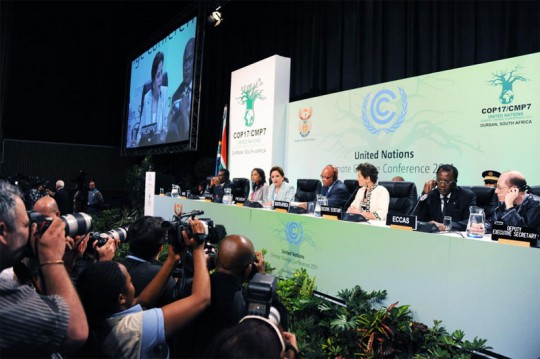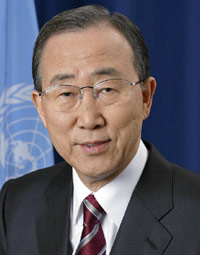Secretary-General welcomes climate change deal reached at UN conference in Durban
Secretary-General welcomes climate change deal reached at UN conference in Durban
 The United Nations Climate Change Conference, Durban 2011
The United Nations Climate Change Conference, Durban 2011
Secretary-General Ban Ki-moon welcomed today the set of decisions reached by countries at the United Nations Climate Change Conference in Durban, South Africa, saying they represent a significant agreement that will define how the international community will address climate change in the coming years.
After extended negotiations over the weekend, the 194 parties to the UN Framework Convention on Climate Change (UNFCCC) agreed on a package of decisions, known as the Durban Platform, which include the launch of a protocol or legal instrument that would apply to all members, a second commitment period for the existing Kyoto Protocol and the launch of the Green Climate Fund.
In a statement issued by his spokesperson Mr. Ban said the new accord is “essential for stimulating greater action and for raising the level of ambition and the mobilization of resources to respond to the challenges of climate change.”
The outcomes of Durban provide a welcome boost for global climate action. They reflect the growing, and in some quarters unexpected, determination of countries to act collectively.
Mr. Ban also welcomed the agreement to establish a second commitment period of the Kyoto Protocol, stating it will “increase certainty for the carbon market and provide additional incentives for new investments in technology and the infrastructure necessary to fight climate change.”
In addition, Mr. Ban said he was gratified that countries reached decisions to implement the Cancun Agreements, which were created at last year”s conference in Mexico. The new measures include setting up a Technology Mechanism that will promote access by developing countries to clean, low-carbon technologies, and establishing an Adaptation Committee that will coordinate adaptation activities on a global scale.
Mr. Ban also welcomed the launch of the Green Climate Fund and said he was gratified that a number of countries signalled their intent to contribute to it. The Fund was created last year to help developing nations protect themselves from climate impacts and build their own sustainable futures, but had not been launched yet, and Mr. Ban had urged developed countries throughout the two-week conference to inject the necessary capital to kick-start it.
“Taken together, these agreements represent an important advance in our work on climate change,” Mr. Ban said, calling on countries to “quickly implement these decisions and to continue working together in the constructive spirit evident in Durban.”
The UN Environmental Programme (UNEP) also welcomed the agreements at the conference, noting that key steps were taken such as negotiating “a new and more inclusive treaty and the establishment of the Green Climate Fund.”
“The outcomes of Durban provide a welcome boost for global climate action. They reflect the growing, and in some quarters unexpected, determination of countries to act collectively,” said UNEP Executive Director, Achim Steiner.
However, UNEP also said the conference still left the world with serious and urgent challenges if a global temperature rise is to be kept under two degrees Celsius in the 21st century.
“The big question many will ask is how this will translate into actual emission reductions and by when? Whatever answer will emerge in the coming months, Durban has kept the door open for the world to respond to climate change based on science and common sense rather than political expediency,” said Mr. Steiner.
###

Ban Ki-moon
Secretary-General of the United Nations.
Ban Ki-moon is the eighth Secretary-General of the United Nations. His priorities have been to mobilize world leaders around a set of new global challenges, from climate change and economic upheaval to pandemics and increasing pressures involving food, energy and water. He has sought to be a bridge-builder, to give voice to the world’s poorest and most vulnerable people, and to strengthen the Organization itself.“I grew up in war”, the Secretary-General has said, “and saw the United Nations help my country to recover and rebuild. That experience was a big part of what led me to pursue a career in public service. As Secretary-General, I am determined to see this Organization deliver tangible, meaningful results that advance peace, development and human rights.”Mr. Ban took office on 1 January 2007. Highlights of his tenure have included:
Promoting sustainable development
One of the Secretary-General’s first major initiatives was the 2007 Climate Change Summit, followed by extensive diplomatic efforts that have helped put the issue at the forefront of the global agenda. Subsequent efforts to focus on the world’s main anti-poverty targets, the Millennium Development Goals, have generated more than $60 billion in pledges, with a special emphasis on Africa and the new Global Strategy on Women’s and Children’s Health. At the height of the food, energy and economic crises in 2008, the Secretary-General successfully appealed to the G20 for a $1 trillion financing package for developing countries and took other steps to guide the international response and protect the vulnerable and poor.
Empowering women
The Secretary-General pressed successfully for the creation of UN Women, a major new agency that consolidates the UN’s work in this area. His advocacy for women’s rights and gender equality has also included the “Unite to End Violence against Women” campaign, the “Stop Rape Now” initiative, the creation of a “Network of Men Leaders” and the establishment of a new Special Representative on Sexual Violence in Conflict. Within the UN itself, the Secretary-General has increased the number of women in senior management positions by more than 40 per cent, reaching the highest level in the Organization’s history.
Supporting countries facing crisis or instability
The Secretary-General has sought to strengthen UN peace efforts, including through the New Horizons peacekeeping initiative, the Global Field Support Strategy and the Civilian Capacity Review, a package of steps to improve the impact of the 120,000 United Nations “blue helmets” operating in the world’s conflict zones. A mediation support unit, along with new capacity to carry out the Secretary-General’s good offices, have been set up to help prevent, manage and resolve tensions, conflicts and crises. Accountability for violations of human rights has received high-level attention through inquiries related to Gaza, Guinea, Pakistan and Sri Lanka, legal processes in Lebanon and Cambodia, and advocacy for the “responsibility to protect,” the new United Nations norm aimed at prevent and halt genocide and other grave crimes. He has also sought to strengthen humanitarian response in the aftermath of mega-disasters in Myanmar (2008), Haiti (2010) and Pakistan (2010), and mobilized UN support for the democratic transitions in North Africa and the Middle East.
Generating new momentum on disarmament, arms control and non-proliferation
The Secretary-General has sought to rejuvenate the disarmament agenda through a five-point plan, efforts to break the deadlock at the Conference on Disarmament and renewed attention to nuclear safety and security in the aftermath of the tragedy at the Fukushima Daiichi Nuclear Power Plant.
Strengthening the UN
The Secretary-Generalhas introduced new measures aimed at making the United Nations more transparent, effective and efficient. These include heightened financial disclosure requirements, compacts with senior managers, harmonization of business practices and conditions of service, the adoption of International Public Sector Accounting Standards, and continued investments in information technology and staff development.
Personal
The Secretary-General was born in the Republic of Korea on 13 June 1944. He received a bachelor’s degree in international relations from Seoul National University in 1970. In 1985, he earned a master’s degree in public administration from the Kennedy School of Government at Harvard University.At the time of his election as Secretary-General, Mr. Ban was his country’s Minister of Foreign Affairs and Trade. His 37 years of service with the Ministry included postings in New Delhi, Washington D.C. and Vienna, and responsibility for a variety of portfolios, including Foreign Policy Adviser to the President, Chief National Security Adviser to the President, Deputy Minister for Policy Planning and Director-General of American Affairs.Mr. Ban’s ties to the United Nations date back to 1975, when he worked for the Foreign Ministry’s United Nations Division. That work expanded over the years, with assignments that included service as Chairman of the Preparatory Commission for the Comprehensive Nuclear Test Ban Treaty Organization and Chef de Cabinet during the Republic of Korea’s 2001-2002 presidency of the UN General Assembly. Mr. Ban has also been actively involved in issues relating to inter-Korean relations.The Secretary-General speaks English, French and Korean. He and his wife, Madam Yoo (Ban) Soon-taek, whom he met in high school in 1962, have one son, two daughters and three grandchildren. Since 2007, Mrs. Ban has devoted her attention to women’s and children’s health, including autism, the elimination of violence against women, and the campaign to prevent mother-to-child transmission of HIV/AIDS.
###
> United Nations (UN).
 The United Nations was established on 24 October 1945 by 51 countries committed to preserving peace through international cooperation and collective security. Today, nearly every nation in the world belongs to the UN: membership totals 192 countries.
The United Nations was established on 24 October 1945 by 51 countries committed to preserving peace through international cooperation and collective security. Today, nearly every nation in the world belongs to the UN: membership totals 192 countries.
When States become Members of the United Nations, they agree to accept the obligations of the UN Charter, an international treaty that sets out basic principles of international relations. According to the Charter, the UN has four purposes:
- to maintain international peace and security;
- to develop friendly relations among nations;
- to cooperate in solving international problems and in promoting respect for human rights;
- and to be a centre for harmonizing the actions of nations.
###
* The above story is adapted from materials provided by United Nations (UN)
** More information at United Nations (UN)




















